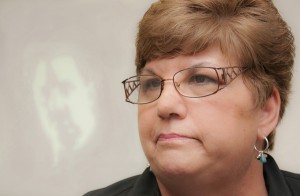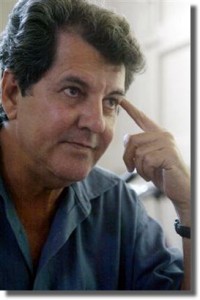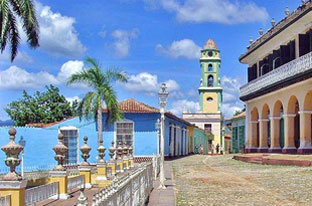“WE HAVE ENCOUNTERED WITH THE CHURCH”
By Fernando Ravsberg 
The Cuban Catholic Church organized last weekend discussion on the reintegration of the diaspora in Cuba. Involving a group of leading intellectuals in exile, scores of scholars of the island, as well as religious and laity. The event is the first of its kind not organized by the Cuban government, despite which discussed the economic, legal and cultural of the possible meeting between Cuban émigrés and living on the island.
Following negotiations that ended with the release of all prisoners of conscience and more than 3000 common criminals, clergy now seems doomed to mediate between Miami and Havana, apparently an effort backed by the government.
One participant was Uva de Aragon, journalist, writer and Deputy Director of the Cuban Research Institute of Florida International University. She agreed to talk to me, “though perhaps an indiscretion” because the event is closed to the press. Uva said that “Cuba is in a time of change and there are many Cubans in the diaspora who would like to accompany her. Between us there is a large economic capital, social and talent that can help the country in those changes.”
 La escritora emigrada Uva de Aragón en La Habana. (Foto de Raquel Pérez)
La escritora emigrada Uva de Aragón en La Habana. (Foto de Raquel Pérez)
The writer felt that the economic reforms show new horizons for the emigrants. “The creation of small businesses opens opportunities to create partnerships between Cuban and out of here,” she said in our conversation.
“Everyone has a relative and there are times when a small investment could start a business,” she explains, adding that this is already clear and done only informally but will increase substantially if there are “legal transparency and guarantees” .
Clarifies that “we can invest but legally, a company registered with guarantees, to clearly define who is the partner, which part belongs to everyone, who are the owners. Black and white, as in the rest of the world. ”
Uva do not know how the Cuban government will take its recommendations, “those things are always a process, but our role as academics is to imagine the future. However the mere fact that it gives the event is a good sign.”
Another issue is the migration cardinal, “in Cuba should make life less difficult, overcharge for passports, visas and other formalities. It is an important issue not only for us but for those living in the island. ”
He further proposed immigration changes announced include “delete the stamp of Final Exit,” by which Cuban citizens who spend more than 11 months was unable to return to reside permanently in the country.
The discussion is based on a document-The Cuban diaspora in the XXI-century intellectuals prepared by Cubans on the island and abroad which analyzes the problems between the government and emigration and recommendations are made to Washington, Miami and Havana.
Although no official statements, it appears that the government welcomed the emigrants to join the changes. Raul Castro recently called them patriots and in solidarity with Cuba, leaving in the past such names as “worms” and “stateless”.
And some do not pray, just weeks behind the successful Cuban-American businessman Carlos Saladrigas lectured in Havana and within days another meeting be held with migrants in the embassy of the island in Washington.
The possibility of investing economically in Cuba begins to be attractive and profitable for some businesses and also for hundreds of thousands of Cubans who might try to start a business with family members at home.
Anti-Castro politicians in Cuba and Miami are most concerned about these dialogs that, if fruitful, may leave them aside from all decisions, with very limited support and no ability to influence the future design of Cuban society.
The dissident Osvaldo Paya, leader of the Christian Liberation Movement, said the organizers “conspire against true reconciliation and peace that can only be achieved by respecting the rights of all Cubans, their freedom of expression and association and free elections” .
However, this political battle will be uphill for the opposition because this time it is not questioning the Cuban government but the Catholic clergy and its most prominent secular intellectuals. “With the Church have encountered, Sancho,” say Don Quixote.
Sources: LettersFromCuba/FernandoRavsberg/R.Perez/InternetPhoto/TheCubanHistory.com
LettersfromCuba/The Cuban History/ Arnoldo Varona, Editor
“CON LA IGLESIA HEMOS TOPADO”
Por Fernando Ravsberg 
La iglesia católica cubana organizó el pasado fin de semana un debate sobre la reinserción de la diáspora en Cuba. Participaron un grupo de importantes intelectuales exilados, una veintena de académicos de la isla, además de religiosos y laicos. El evento es el primero de su tipo no convocado por el gobierno cubano, a pesar de lo cual se debatieron los aspectos económicos, legales y culturales de ese posible reencuentro entre los emigrados y los cubanos que viven en la isla.
Tras la negociación que terminó con la liberación de todos los prisioneros de conciencia y más de 3000 presos comunes, el clero parece abocado ahora a mediar entre Miami y La Habana, un esfuerzo aparentemente respaldado por el gobierno.
Uno de los participantes fue Uva de Aragón, periodista, escritora y Subdirectora del Instituto de Investigaciones Cubanas de la Universidad Internacional de la Florida. Aceptó conversar conmigo, “aunque tal vez sea una indiscreción” porque el evento está cerrado a la prensa. Uva asegura que “Cuba está en un momento de cambio y hay muchos cubanos de la diáspora que quisiéramos acompañarla. Entre nosotros hay un gran capital económico, social y de talento que puede ayudar al país en esos cambios”.
 La escritora emigrada Uva de Aragón en La Habana. (Foto de Raquel Pérez)
La escritora emigrada Uva de Aragón en La Habana. (Foto de Raquel Pérez)
La escritora percibe que las reformas económicas muestran nuevos horizontes para los emigrados. “La creación de las pequeñas empresas abre las posibilidades de crear sociedades entre los cubanos de fuera y los de aquí”, me dice en nuestra conversación.
“Todo el mundo tiene un pariente y hay veces que con una inversión pequeña se podría montar un negocio”, me explica Uva y agrega que esto ya se hace informalmente pero aclara que solo se incrementará de forma sustancial si hay “trasparencia legal y garantías”.
Aclara que “podemos invertir pero de forma legal, en una compañía inscrita, con garantías, donde se defina claramente quien es el socio, que parte le corresponde a cada uno, quienes son los dueños. En blanco y negro, como se hace en el resto del mundo”.
Uva no sabe cómo tomará el gobierno cubano sus recomendaciones, “esas cosas siempre son un proceso pero nuestro papel como académicos es imaginarnos el futuro. De todas formas el solo hecho de que se dé el evento es una buena señal”.
Otro de los temas cardinales es el migratorio, “en Cuba deberían hacernos la vida menos difícil, cobran en exceso por los pasaportes, las visas y los demás trámites. Es un tema importante y no solo para nosotros sino también para los que viven en la isla”.
Propone además que los cambios migratorios anunciados contemplen “eliminar el cuño de Salida Definitiva”, mediante el cual los ciudadanos cubanos que pasan más de 11 meses fuera no pueden volver a residir permanentemente en el territorio nacional.
El debate se basa en un documento -La diáspora cubana en el siglo XXI- elaborado por intelectuales cubanos de la isla y del exterior donde se analizan los problemas entre el gobierno y la emigración y se plantean recomendaciones a Washington, Miami y La Habana.
A pesar de que no hay declaraciones oficiales, todo indica que el gobierno ve con buenos ojos que los emigrados se sumen a los cambios. Recientemente Raúl Castro los llamó patriotas y solidarios con Cuba, dejando en el pasado los apelativos de “gusanos” y “apátridas”.
Y algunos no se hacen rogar, apenas unas semanas atrás el exitoso empresario cubanoamericano Carlos Saladrigas dio una conferencia en La Habana y en unos días se celebrará otro encuentro con emigrados en la sede diplomática de la isla en Washington.
La posibilidad de invertir económicamente en Cuba empieza a resultar atractiva y rentable para algunos empresarios y también para cientos de miles de cubanos de a pie que podrían intentar montar un negocio con sus familiares dentro del país.
Los políticos anticastristas de Cuba y Miami ven con mucha preocupación estos diálogos que, en caso de fructificar, podrían dejarlos al margen de las decisiones, con un apoyo muy reducido y sin capacidad de influir en el diseño futuro de la sociedad cubana.
El disidente Osvaldo Payá, líder del Movimiento Cristiano Liberación, afirma que los organizadores “conspiran contra la verdadera reconciliación y la paz que sólo puede lograrse si se respetan todos los derechos de los cubanos, su libertad de expresión y asociación y se celebran elecciones libres”.
Sin embargo, esta batalla política será muy cuesta arriba para la oposición porque esta vez no se trata de cuestionar al gobierno cubano sino al clero católico y a sus más destacados intelectuales laicos. “Con la Iglesia hemos topado, Sancho”, diría el Quijote.
Sources: LettersFromCuba/FernandoRavsberg/R.Perez/InternetPhoto/TheCubanHistory.com
LettersfromCuba/The Cuban History/ Arnoldo Varona, Editor



 Letters From Cuba (04/26/12)
Letters From Cuba (04/26/12)
